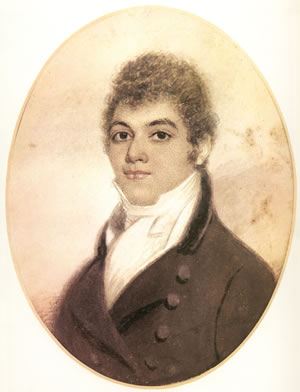The mercurial Beethoven had a way of tearing up dedications to people he once admired. If not for this habit, the Kreutzer Sonata would have been titled “Sonata for a Mulatto” and Tolstoy would not have written his short story decrying the salacious effects of violin sonatas. (The final dedicatee disliked Beethoven’s music and never played the work.)
The noted black violinist, pianist and composer George Augustus Polgreen Bridgetower (1778-1860) was introduced to Beethoven in 1803. The pair premiered the sonata (Opus 47) at Vienna’s Augarten Theater at 8 a.m. May 24 of the same year to a distinguished audience, without a rehearsal.
There was not even time to make a full copy for the violinist who had inspired it, and Bridgetower played the second movement from the manuscript, looking over Beethoven’s shoulder. Even more remarkable is that Bridgetower inserted an improvised decoration and Beethoven got up from the piano and said, “Noch einmal, mein lieber Bursch” (“Once more, my dear fellow”), quite pleasantly. Later, he gave him his tuning fork.
The sonata, which Kreutzer called “unplayable,” was well received by the assembled aristocracy.
Before the work could be published, however, Bridgetower apparently insulted a female friend of the composer in a bar. Maybe it was a good thing. The sonata was to have been titled “Sonata mulattica composte per il mulatto Brishdauer, gran pazzo e compositore mulattico” (“Mullato Sonata composed for the mulatto Brischdauer, big wild mulatto composer”).
Like Mahler a century later, Bridgetower connects many cultural strands. As a boy, his father was employed, along with Haydn, on Prince Esterhazy’s estate, and he may have taken lessons from the master. At any rate, he played a concert with him. Thomas Jefferson saw him perform in Paris in 1789 as a child prodigy.
Bridgetower was a member of the Prince of Wales’ (later George IV) household. Before being granted leave to go to Europe alone (ostensibly to see his mother and brother in Dresden), he played in more than 50 concerts in Paris, London, Bath and Bristol.
Upon his return to England, he was elected to the Royal Society of Musicians and was granted the degree of Bachelor of Music by Cambridge University in 1811. He was highly successful and able to travel extensively abroad.
He was in demand as a teacher, not just of violin but also piano, and published a piano method, “Diatonica armonica,” in 1811.
Readers may have seen him playing the Kreutzer Sonata in the 1994 Beethoven film “Immortal Beloved.” The British film “A Mulatto Song,” released in 1996, includes Bridgetower’s father, John Frederick (who was probably from Barbados). The Prince Regent exiled the father for “immoral behavior” but hung onto the more talented son.
A book about Bridgetower, “Sonata Mulattica,” was published in 2009 by Rita Dove, a Pulitzer Prize winner and former U.S. poet laureate. The book, a collection of poems, is subtitled “A Life in Five Movements and a Short Play” and combines fact and fiction to flesh out the life of an intriguing and gifted man about whom too little is known.
Classical music lovers who wish to celebrate Black History Month should visit William Zick’s excellent website, chevalierdesaintgeorges. homestead.com, for information on a long list of black classical composers and musicians.
Christopher Hyde is a writer and musician who lives in Pownal. He can be reached at:
classbeat@netscape.net
Send questions/comments to the editors.



Success. Please wait for the page to reload. If the page does not reload within 5 seconds, please refresh the page.
Enter your email and password to access comments.
Hi, to comment on stories you must . This profile is in addition to your subscription and website login.
Already have a commenting profile? .
Invalid username/password.
Please check your email to confirm and complete your registration.
Only subscribers are eligible to post comments. Please subscribe or login first for digital access. Here’s why.
Use the form below to reset your password. When you've submitted your account email, we will send an email with a reset code.